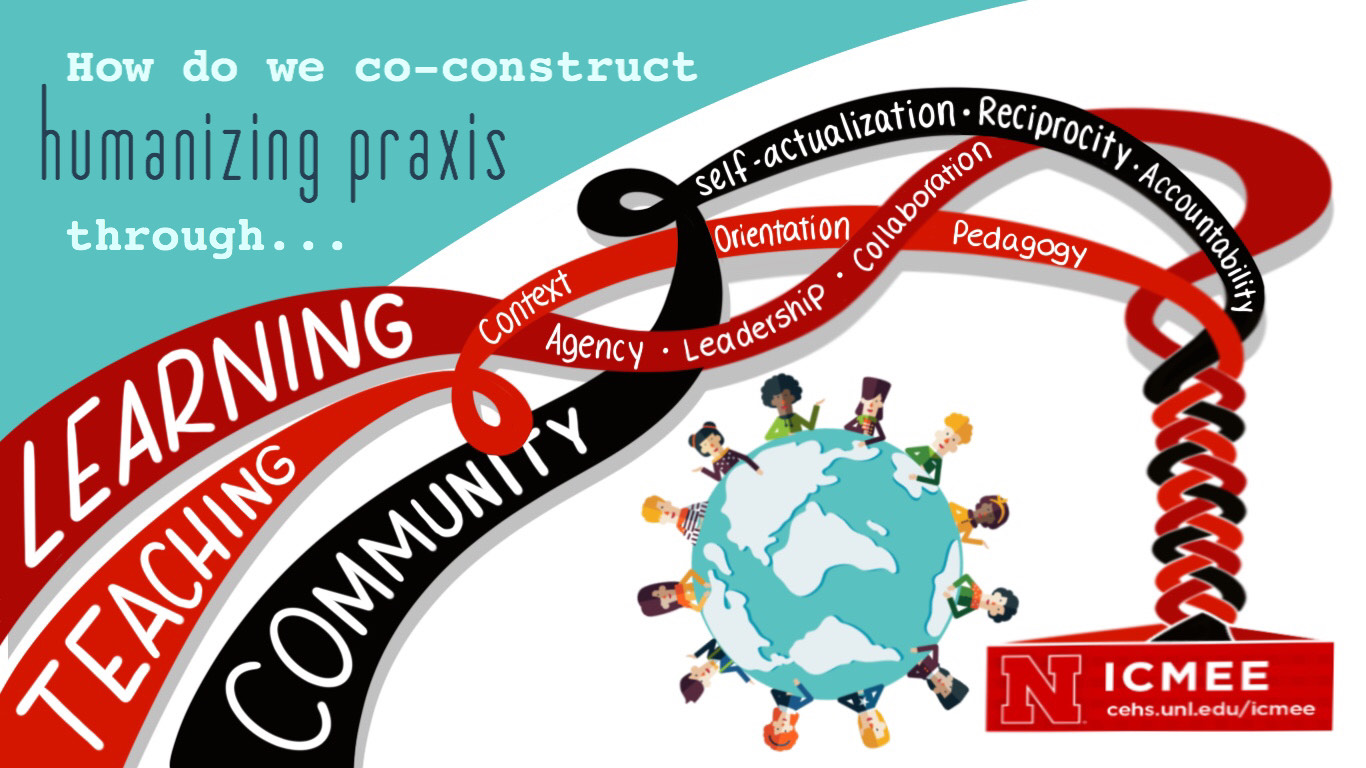
In August of 2020, ICMEE entered its fifth and final year of our current grant funding. As we continue our current work, the events of the past year have also helped us recommit to our foundational values as we continue our work and plan for what is next. As a result, we have updated our name. ICMEE now stands for International Coalition for Multilingual Education & Equity.
Our Core Commitments: Learners, Community, and Curriculum:
We seek to end our complicity and comfort with violence, oppression and anti-black practices, discourses and institutional structures, particularly in our fields of teacher education and language education. To do this, we examine our own complicity with these firm-standing racial and linguistic hierarchies and work together to find opportunities to actively disrupt such inequities and to envision and enact liberation from oppression. We seek to accomplish this through principled and value-centric practices and approaches. Currently, our focus is around broad ideas regarding learners, community, and curriculum. Each of these areas are intertwined with the other and are composed of multiple facets themselves. In a way, we are braiding together ideas, principles and theories that we envision helping us weave a vision for and create possibilities of abolition, decolonization, freedom, and equity.
Learners:
Our work is grounded in the belief that teacher learners should have substantial agency over their learning. However, we also believe this is true for learners of all ages and stages. Learner agency includes, but is not exclusively represented by: the materials learners engage with, the problems learners seek solutions for, and the work learners share with their peers. In relationship to learner agency, the leadership roles and practices learners put into place have a strong impact on both a learner’s own learning, but also the learning of their peers and the learning community collectively. In addition to this commitment to learner agency and leadership, we also focus on learners engaging in meaningful collaboration. In the collaborative space of exchanging ideas, interrogating the ideas of others as well as imagining the possibilities of new ideas in practice, learners bring and extend their knowledges in a space of mutual expansion.
Community:
In order for learners to truly have agency, take leadership and learn well in collaboration, equitable learning communities need to be developed. We believe the principles of self-actualization, reciprocity and accountability (Simpson, 2017) are fundamental to the development of abolitionist, decolonizing, freedom, and equity-focused learning communities. These three principles are intricately connected and in combination generate incredible possibilities for transformative, equity-based learning to occur. Self-actualization is important individually as well as collectively for it is how we both work towards being and bringing our truest selves to learning spaces while we also create that possibility for other members of our learning communities. Through self-actualization we strive to have all of the identities (understood as dynamic and potentially shifting, even during the short timeline of an eWorkshop or course) of the learning in our communities affirmed in our learning spaces. We recognize that self-actualization can only successfully occur in reciprocity where our own self-actualization cannot come at the cost of that of another. Further, we have to hold ourselves accountable to the principles of self-actualization as we live in a colonial, white supremacist, ableist, heteropatriarchy, that has been established to limit self-actualization in very tangible and violent ways.
Curriculum:
Since the terrain of ICMEE as a learning organization is built on teacher learning as well as multilingual education and equity, the focus of our curriculum is guided by the research on preparing teachers to work with multilingual students (Viesca et al., 2019). In our analysis of this literature, attending to the complex realities of teaching and learning, we identified three important curricular elements: context, orientations and pedagogy. Context provides the opportunity to explore historical and contemporary socio-political projects and discourses that impact teaching and learning. Orientations provides the opportunity to explore various perceptions and positionalities include our orientation to teaching, learning, students, and oppression. Pedagogy provides the opportunity to learn about as well as put into practice the theories and processes that create the possibilities for transformative learning. To us these theories and practices should be fundamentally dialogic, critical, sociocultural, joyful, and inquiry-based.
To learn more about our Coalition visit: https://cehs.unl.edu/icmee/what-icmee/
More details at: https://cehs.unl.edu/icmee/what-icmee/